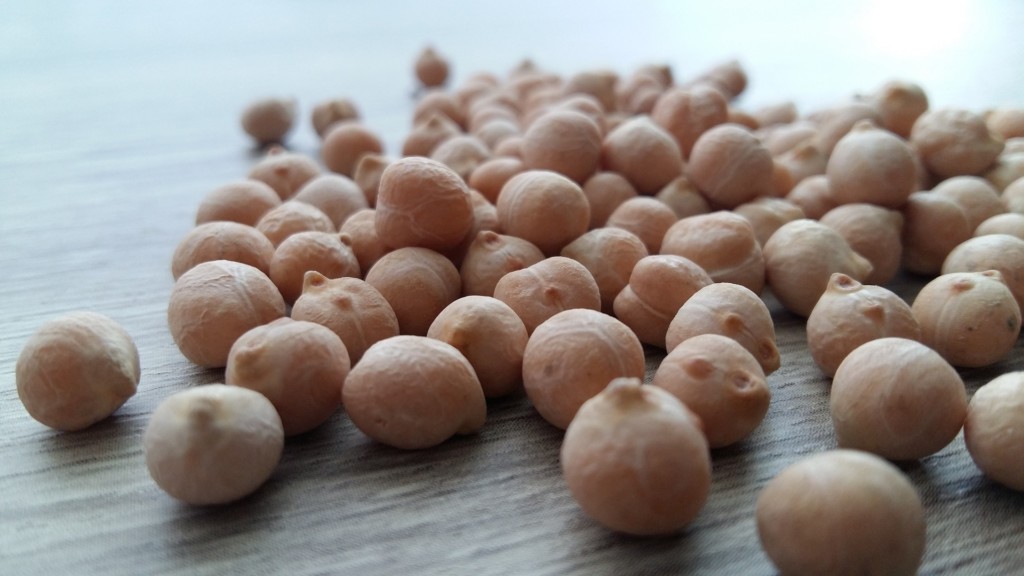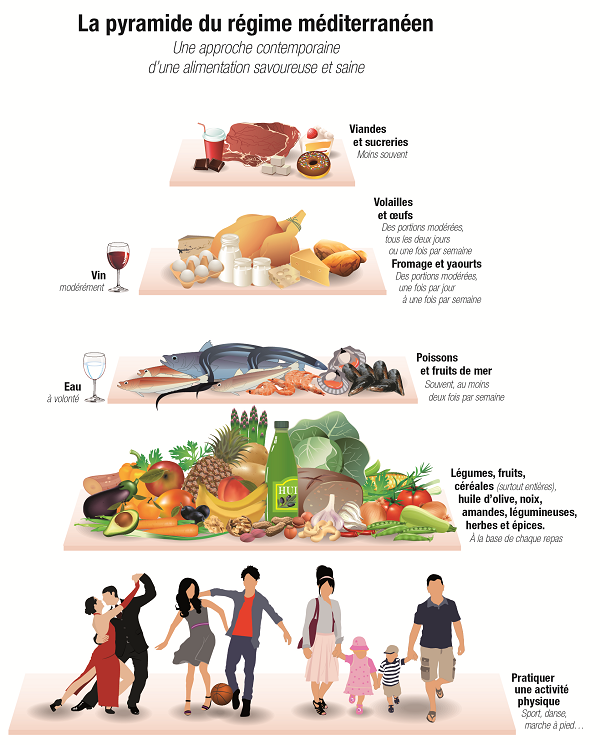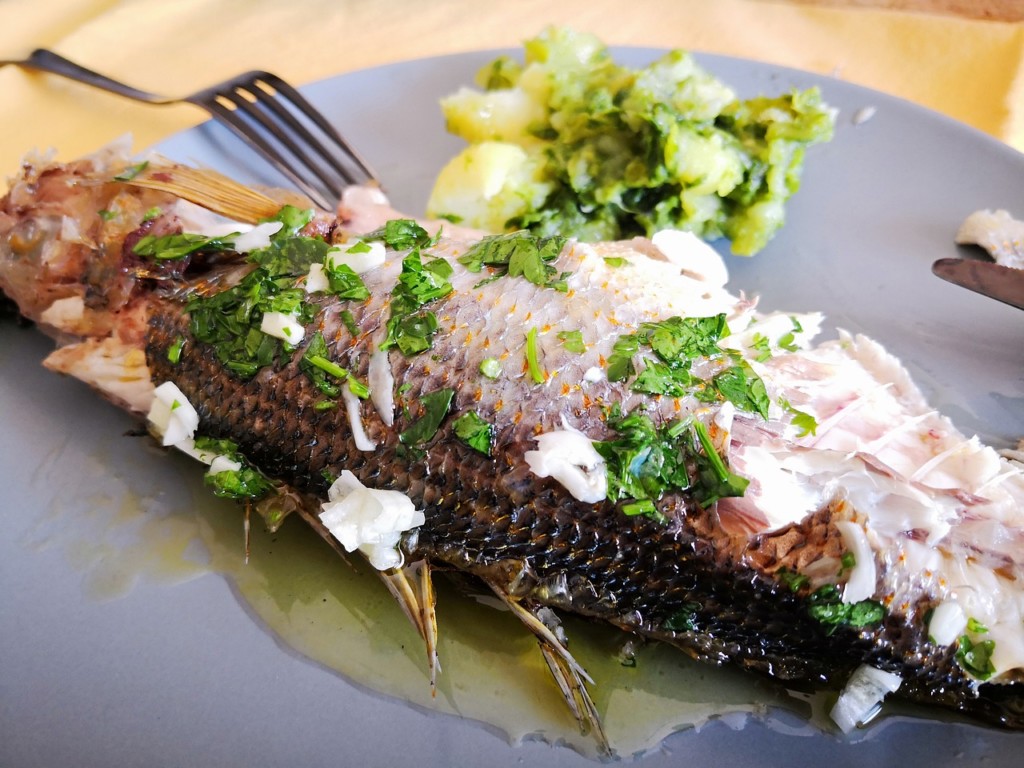Hello and welcome to the summary and introduction of our great guide to Mediterranean dietwhich constitutes one of the pillars of Guide Blooness, the guide dedicated to the ideal diet. As a reminder, this guide is a kind of white paper, a compendium of what currently exists on the most optimal way to eat for good health and a slimmer figure.
It is based on several major pillars, including a low-to-moderate carbohydrate diet, which we have already covered at length in the section devoted to this topic in numerous chaptersand here on the large pillar of the Mediterranean dietone of the ways to the healthiest diets in the worldIf coupled with a controlled carbohydrate diet, this will be a devilishly effective way of optimizing health and weight. Other major pillars are still to come, but we'll come back to them in due course.
Find the summary of the ultimate guide to the Mediterranean diet at the bottom of this article.
In this article, you will learn how to summary of the Mediterranean diet, its supposed and proven health benefits, and the foods that make it up. It's a sort of introduction to what we're going to detail, chapter by chapter, in this section dedicated exclusively to this diet, the summary of which you'll find at the end of this page.
Why the Mediterranean diet?
The Mediterranean diet is correlated with good cardiovascular health, remarkable longevity, and good physical and mental health. As a result, it continues to fascinate dieticians and nutrition enthusiasts alike. In fact, the Mediterranean diet, along with the Okinawa diet, are considered the two best diets in the world today, by a large part of the scientific community.
This content is part of the guide Blooness, the guide to the ideal human diet, the summary of which you can find here 🌱🥑
For our part, we've tried to take the best of this diet, to enrich the Blooness guide, and to couple it initially with the moderate carbohydrate diet which, as we've just mentioned, forms the main part of our guide, and subsequently with other types of diet which will complete our guide.
The idea behind integrating the Mediterranean diet is to take advantage of all the virtues it has to offer as part of an "ideal human diet". Indeed, empirically, it is possible to and list the foods eaten in Mediterranean regionsWe know that they are probably vectors of good health for the populations who live or have lived in the areas bordering the Mediterranean, when they were still spared mass consumption and industrial products.
French-speaking subscribers will receive the newsletter in French, and all others will receive an English version.
In making this inventory of listing of the world's healthiest foodsand by integrating them into our daily lives, we help to improve our general health. That's what we're going to try to do in this large part of the Blooness guide.
But just before drawing up this list, and dedicating a chapter of its own to each major ingredient group, we couldn't approach this major theme without giving it a proper introduction. First of all, by defining what this diet is all about, how it differs from and, above all, relates to the low-carb diet, which is also one of the pillars of the guide, and by briefly recalling its virtues and history.
Let's start with its virtues, because if this diet is getting good press, it's worth remembering why.
What are the virtues of the Mediterranean diet?
Here are just a few of the benefits of a Mediterranean-style diet. I say "quickly" because there's no scientific doubt about the benefits of a Mediterranean diet, and the web is full of information and new studies that point in this direction, and it would take too long to list them all here.
- Reduction in overall mortality.
- Reduced cardiovascular pathologies.
- Protection against high blood pressure HPA: HPA is an excessive rise in pressure in the arteries, which persists over time. It is the most common chronic disease in the world, and its consequences can be very serious.
- Increased bone density and muscle mass.
- Depression prevention.
- Improved fertility.
- Reduced risk of Alzheimer's disease.
- Reduced risk of metabolic syndrome also known as "potbelly syndrome".
- Reduced risk of type 2 diabetes.
- Reduced risk of Parkinson's disease
- Reduced obesity and weight loss
- Reduced risk of gout
What's more, according to scientific data that continues to pour in, people with Mediterranean eating habits have fewer cancers, inflammatory diseases, overweight, metabolic syndromes, etc...
In fact, there is no single diet to follow that would objectively and reliably achieve health goals with a promise of results. This is partly because there are many different Mediterranean diets, and partly because the studies are based on observation.
That said, in practical terms, the method used by various nutritionists consists of imitate eating habits traditional of certain peoples of the Mediterranean in order to reap the benefits in terms of health.
The application of this system has a clear objective, even if it is not guaranteed: toextend life expectancy by protecting against cardiovascular disease, cancer and other degenerative or metabolic illnesses. In other words, it involves providing the body with the foods consumed in Mediterranean areas, where, particularly during the 20th century, remarkable life expectancy has been observed, with limited or no outbreaks of certain diseases that are common elsewhere in developed societies, and all this despite a sometimes rudimentary healthcare system.
Definition of the Mediterranean diet
Let's see what Wikipedia has to say:
Visit Mediterranean dietalso known as Cretan diet or Mediterranean diet is a traditional dietary practice in many countries around the Mediterranean Sea, characterized by the abundant consumption of fruits, vegetables, legumes, whole grains, herbs and olive oilA moderate consumption of dairy products, eggs and wine, a limited consumption of fish and a low consumption of meat.
In other words, the Mediterranean diet gives pride of place to fruits, vegetables, legumes, whole grains and fats via olive oil in particular. It's a diet that could almost be described as "flexitarian", in the sense that a large part of its intake comes from plant proteins, provided by a high consumption of legumes and whole grains.
The Mediterranean diet promotes plant consumptionIt's all about quality fats, mainly polyunsaturated, and whole grains. Conversely, red meat, sugar and industrial products, which form the basis of the modern Western diet (and not only), have a very limited place.

In addition to the nature of the food itself, we should also note how to grow themand therefore their quality. So, in the Blue Zones in general, and of course in the Mediterranean, food comes from local, seasonal agriculture, with traditional processes and relatively little food processing. As a reminder, Blue Zones are a concept grouping together areas of the world where life expectancy far exceeds the global average, and where "diseases of civilization" (diabetes, cancer, hypertension, thyroid disease, etc.) are rarer than elsewhere. We can consider a large part of the Mediterranean to be part of these Blue Zones.
Then, in addition to diet, the researchers also described the Mediterranean lifestyle, which is that of the Blue Zones. This lifestyle is characterized by frequent and moderate physical activity, exposure to the sun, attachment to the community and, more generally, a joie de vivre.
Last but not least, the Mediterranean diet is not a weight-loss diet. However, one of its collateral consequences is precisely a loss of body fat, over the long term, for those who are overweight.

On November 16, 2010, the "Mediterranean diet" was inscribed on UNESCO's Representative List of the Intangible Cultural Heritage of Humanity as a "body of know-how, knowledge, practices and traditions".
The origins of the Mediterranean diet
It was formerly known as the "Cretan diet. It became famous thanks to the work of two doctors and scientists: Serge Renaud, then Michel de Lorgeril, who, with the help of other scientists, carried out the famous Lyon Diet Heart Study.
This study tested the efficacy of a Mediterranean diet on 600 patients who had survived a myocardial infarction over almost four years. A control group followed the recommended nutritional advice to lower cholesterol, and an experimental group followed a Mediterranean diet. The results were indisputable. There was a 50 to 70% reduction in the risk of heart attack in the experimental group, fewer cardiovascular complications (pulmonary embolism, stroke, etc.), less cancer and improved life expectancy.
Other studies have since confirmed the hypothesis that the Mediterranean diet is beneficial to overall health.
In terms of food alone, does this mean that we have to copy exactly the foods eaten in these regions? What about quantities? How do we go about it? Things aren't quite that simpleWe'll get to the bottom of these important questions a little later. Before that, let's look at how the Mediterranean diet differs from the Low-Carb diet touted in this guide, and what the link is between the two.
Mediterranean diet and low-carb lifestyle
As we said in the preamble, the Mediterranean diet has been recognized as one of the healthiest in the world. Now, in this diet, fats can account for up to 40% of macronutrient intake (contrary to those who still believe that fats are harmful to health), which is consistent with what has been stated in this guide so far.
However, a not insignificant part, up to about 30% of caloric intake, sometimes more, can come from carbohydrates (which might come as a surprise to the most assiduous fringe of the low-carb diet).
This fairly even split between proteins, carbohydrates and fats could disconcert many a lifestyle advocate. keto or low-carb. However, the subtlety of the Mediterranean diet consists in supply the body with high-quality carbohydratesThis is in contrast to the carbohydrate-rich foods frequently consumed in modern societies since the 1960s.
As a result, this way of eating has much more in common with the low-carb diet than you might think. In both cases, it's a question of giving pride of place to good fats and quality proteins, to the detriment of sugar and unhealthy carbohydrates..
Although it's true that the Mediterranean diet is richer in carbohydrates than the low-carb diet generally practiced, it favours carbohydrates with low to moderate glycemic indexgood quality, consumed as part of a Mediterranean lifestyleas described above, i.e. a lifestyle characterized by frequent, moderate physical activityand an openness to others.
In other words, the carbohydrates provided by the Mediterranean diet have nothing in common with those we're used to consuming in developed Western countries. Gone are the days of white rice, white pasta, industrial noodle soups and white burger buns. Into the Mediterranean diet, give preference to legumes, whole grains and the fructose provided by a few fruits. This type of carbohydrate, as we saw in the glycemic index chapterThey have little effect on insulin, and do not erode its effectiveness. On the contrary, they are released more slowly into the body, and are much richer in protective nutrients than "processed" carbohydrates as we know them.
Finally, Mediterranean populations were accustomed to working outdoors and being active, the exact opposite of the sedentary lifestyles that have developed with the tertiarization of developed countries. These low-GI, good-quality carbohydrates can only be welcomed by the body, which in a way, to illustrate the point, burns them without any qualms. Whereas carbohydrates from refined and processed ingredients, consumed as part of a sedentary lifestyle, can only lead to overweight, uneven energy levels, mood swings and long-term health problems.
Once these reminders have been made, the Mediterranean diet can be considered as a kind of a moderate carbohydrate dietand is characterized by a contribution in quality carbohydratesThis changes the way we think about carbohydrates and their energy impact on the body.
Moreover, it's not a question of "choosing" between the Mediterranean diet and the low-carb diet, but rather of bringing the best of the Mediterranean diet to the "raw" low-carb.
In fact, there are many different ways of eating low-carb. We can eat two hard-boiled eggs in the morning, chicken breast and a portion of lentils for lunch, toasted and salted almonds in the afternoon, and canned tuna with microwaved broccoli in the evening, without seasoning or spices. It's low-carb, but tasteless, deprived of healthy nutrients, and the antithesis of the Mediterranean diet. What's more, it's not sustainable in the long term, because pleasure and the awakening of the senses are part of an ideal diet, and essential for health and mood. And that's what the Mediterranean diet is all about, if only through the quality and originality of its ingredients.
As for the question of the proportion of carbohydrates in a Mediterranean diet in which we don't want to gain weight - and this is a sensible question - in practice it depends on your energy expenditure, your experience, your feelings, the season in progress, the stress of the moment, and many other parameters. This is a technical and important subject to which we'll return later. In the meantime, the most important thing is to adjust your carbohydrate intake according to your energy expenditure, by allowing yourself, for example, a day every 4 to 7 days with a higher carbohydrate intake, if possible from healthy sources and therefore always "mediterranean-compatible".
In the meantime, let's start with the basics: here's a summary, by food family, of what's eaten in the different regions of the Mediterranean.
Summary of the Mediterranean diet guide
Here are all the contents free of charge of this guide to the Mediterranean diet in podcast format (premium content is available in audio format). in articles reserved for Blooness members) :
Introduction and table of contents (you are here)
Part 1: plants in the Mediterranean diet
- Feeding the Blue Zones
- Mediterranean diet: the ultimate list of the best vegetables to eat for good health
- Mediterranean diet: the complete list of spices, condiments and herbs
- Mediterranean diet: the important question of cereals
- Top healthy breads, when and how to eat them
- Mediterranean diet: the vital importance of legumes
Part 2: Fruit in the Mediterranean diet
- Mediterranean diet: the vital importance of oilseeds for health, waist circumference and longevity
- Mediterranean diet: the best dried oleaginous fruits for health, waistline and longevity - [MEMBER ZONE]
- Mediterranean diet: the ultimate guide to the best oilseeds for health - [MEMBER ZONE]
- Mediterranean diet: all you need to know about olives and olive oil (calories, benefits and recommended intakes) - [MEMBER ZONE]
- Why the avocado is one of the healthiest fruits in the world - [MEMBER ZONE]
- What you need to know about the health-giving powers of coconut and its oil - [MEMBER ZONE]
- Mediterranean diet - the ultimate guide to fruit and fructose: good or bad for your health? - [MEMBER ZONE]
- The 10 best fruits for health and weight loss
Part 3: proteins in the keto-mediterranean diet
- The ideal protein intake for the keto-mediterranean, paleo, carnivore and low-carb diets
- Protein intake: what are the risks of eating too much? - [MEMBER ZONE]
- Are you protein deficient? Discover the signs, risks and reasons for protein deficiency - [MEMBER ZONE]
- The various protein bioavailability indicators - [MEMBER ZONE]
- The ultimate list of the most bioavailable and healthiest protein foods for the body - [MEMBER ZONE]
- Weight maintenance, weight loss and vitality thanks to proteins in keto, low-carb and Mediterranean diets - [MEMBER ZONE]
- Optimal intakes of proteins, carbohydrates and fats for the best possible health and figure - [MEMBER ZONE]
To come in part 3 :
- eggs
- fish and shellfish
Part 4: Meat in the keto-mediterranean diet
In this section, we'll list the best dietary sources of protein from meat, as well as the labels and farming methods to choose in order to increase the chances of optimizing health and longevity on keto, carnivorous, paleo, Mediterranean and anti-inflammatory diets.
- Meat in the keto-mediterranean diet (Contents)
- The difference between red meat, white meat and tripe
- The ultimate guide to organ meats for full health on a keto and Mediterranean diet. [MEMBER ZONE]
- Cattle, sheep, pigs: a guide to animal families and their characteristics
- Ruminant feed: from its origins to the changes made by man - [MEMBER ZONE]
- Chicken and health: from ancestral diet to intensive farming, the keys to quality white meat - [MEMBER ZONE]
Coming soon:
- The best meat labels, chains and farming methods for your health
- Different cooking methods (grilling, braising, etc.)
- The different cuts of beef
- The different cuts of lamb
- The different cuts of pork
- Poultry
- Animal fats
- The ultimate list of the best cuts of meat and how often to eat them
Part 5: Dairy products in the keto-mediterranean diet
Part 6: Drinks in the Mediterranean diet
- Drinks in the Mediterranean diet
- Wine in the Mediterranean diet
Part 7: Lifestyle, energy and weight loss in the Mediterranean diet
- Foods to limit in the Mediterranean diet
- The Mediterranean lifestyle
- The French paradox
- Why and how the Mediterranean diet is good for your health
- Weight loss on the Mediterranean diet
- Carbohydrate intake in the Mediterranean diet
Part 8: Blue Zones
The Okinawa diet
Ikaria island diet
Food on the Nicoya Peninsula
The Loma Linda diet
The regime on Kitava Island, New Guinea
Regime in certain areas of India
Conclusions
- Conclusion on the Mediterranean diet
- Putting the Mediterranean diet into practice
In short, quite a program, which we suggest you start with vegetablesThis is where the problem lies in today's society.



